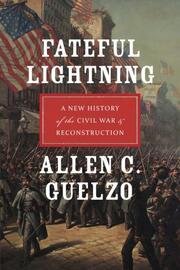“Fateful LIghtning: A New History of the Civil War” — Allen Guelzo
It is my contention that every American should know something about the American Civil War. Ken Burn's wonderful PBS documentary is the place to start, but certainly not the place to finish. The documentary is visually compelling, but pretty thin on substance. Besides, if you go no further than the Burn's documentary you cannot advance to Civil War "buff" status. Those of you familiar with the Seinfeld-Costanza dialogue on this topic will know what I mean.
The Civil War looms large even today. The war was a national trauma. The scars remain. Those who have walked the Antietam battlefield and stood at the end of "bloody lane" can only imagine the carnage which took place there. Those of you who have been to Gettysburg have seen something of the size and extent of the war's various battles. The scale (the battlefield covers miles) and huge number of monuments from individual states and their regiments reveal the fact that this was a national war. Men who likely never left their hometowns before, died in droves in far away Pennsylvania. The national cemetery (where Lincoln gave his famed address) is a grim reminder of this fact.
More importantly, the Civil War provides the historical context for virtually all contemporary discussions of race, state's rights, and even economics. The Civil War gave us several presidents (i.e., Grant, Hays, and Garfield), left us with a more centralized and powerful federal government (for good or ill), gave us some of our greatest heroes (Joshua Lawrence Chamberlain comes to mind, as does Clara Barton), two of our greatest generals (Lee and Jackson), and some of our most controversial figures (i.e., John Brown, Abraham Lincoln) as well as notorious villains (John Wilkes Booth and Nathan Bedford Forrest).
For many years I have recommended James McPherson's Pulitzer Prize winning book on the Civil War, Battle Cry of Freedom (Click Here) as the go-to volume. I still recommend it. It is well written, covers the subject quite well (for a survey), and is especially strong in recapping the War's many brutal and bloody battles. Everyone should read it. It will get you started as my own Civil War library will attest.
But Allen Guelzo's new book on the war, Fateful Lightening, is also a must read. Guelzo gives us a much more wide-ranging survey than does McPherson. Guelzo's volume is not as strong on the details of battle, but he does something from which the average reader choosing a single volume survey will greatly benefit--a thorough explanation of the causes of the war, an important discussion of the debate during the war over slavery and its future, as well as an important treatment of the turmoil created in the war's aftermath (reconstruction).
Guelzo writes well, and has a wonderful knack for how much human interest material to include, so as to continually remind the reader that this was a war fought by real folk who underwent tremendous personal suffering and manifested remarkable courage.
If you've seen Ken Burn's PBS documentary and stopped there, press on! You still need to read Guelzo or McPherson (probably both). Of the two (and it is a close call), read Guelzo. You can find it here: Guelzo on Amazon
